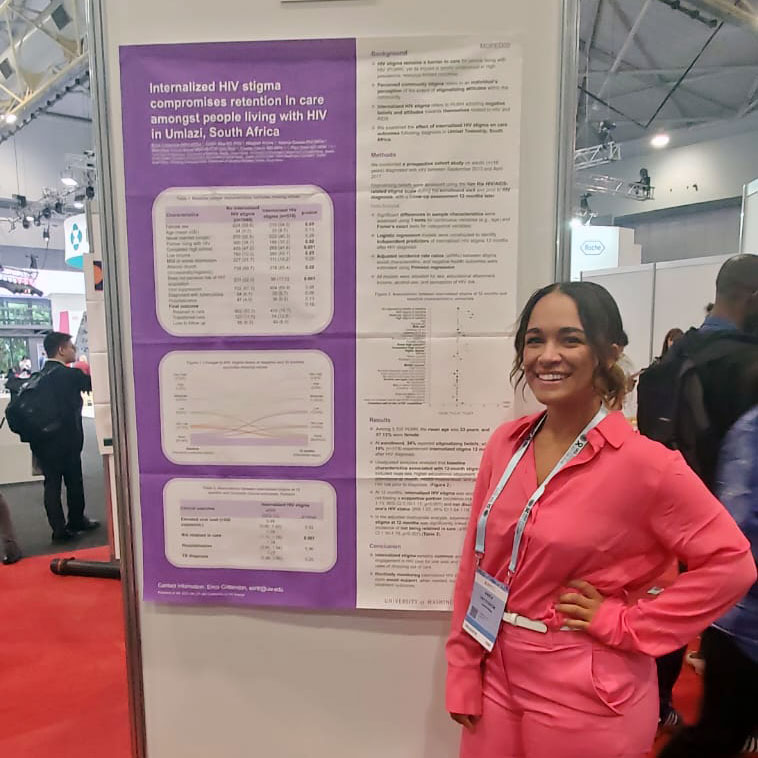Name: Erica Crittendon
Status: MS3, Seattle
Title: Internalized HIV stigma compromises retention in care amongst people living with HIV in Umlazi, South Africa.
Erica Crittendon’s presentation of her research took a fascinating turn when she was interviewed by an hiv.gov representative after her poster session at the International AIDS Society’s (AIS) conference in Brisbane, Australia.
The study found that people who had demonstrated internalized stigma had a great risk of dropping out of care. People who drop out of care, not surprisingly, face a higher risk of mortality than those who remain in care.
The director of HIV.gov, Miguel Gomez, interviewed Crittendon and Louis Shackelford, acting director of external relations, HIV Vaccine Trials Network, Fred Hutch. You can watch the video here.
Why HIV research? I’ve been engaged in HIV-related work since 2015. I instantly fell in love not only with the science, but the health equity and social justice components that are inherent to the work. It’s such a special field, and I feel privileged to contribute to such important research.
Why is the study of stigma important? Regrettably, despite the advancements in HIV treatment and prevention, HIV-related stigma continues to be a pervasive global phenomenon, posing a significant obstacle to achieving substantial advancements in our responses to the HIV and AIDS epidemic. The hope is that my work will contribute to our understanding of where HIV stigma impacts clinical care to inform interventions that improve outcomes for patients living with HIV.

What do you think incoming students should know about scholarship and research?
- I solidified my research interests and sought out projects early on. I became involved with the study I presented on at IAS 2023 through the SOM’s project directory, however, I’ve also become involved with another HIV-related project by talking to faculty members about my research interests who have connected me to their colleagues conducting HIV research.
- Funding to attend conferences as a medical student is a challenge. International conferences can prove to be a further financial obstacle. For me, planning ahead of time to apply for conference scholarships and small travel grants helped relieve some of that financial burden. Honestly, I haven’t gotten every opportunity that I’ve applied for. What it came down to was having one or two people in my corner who believe in me and my work enough to help me find the funding to present it.
- Solidifying my research interests early on also helped me to network deeper in the HIV field and, more importantly, become more involved with community-work focused on HIV and AIDS. I’m now associated with multiple organizations outside of the School of Medicine, including the UW Center for AIDS Research Office of Community Engagement and Pierce County AIDS Foundation, and it’s because of those connections that I’ve been presented with opportunities to amplify findings from my research. In addition to the NIH interview, I was asked a couple of times at IAS to give a talk about HIV stigma. We hear starting with MS1 that it’s about the quality and not quantity of extracurricular experiences that you partake in as a medical student, and for me that certainly has been the case so far.

